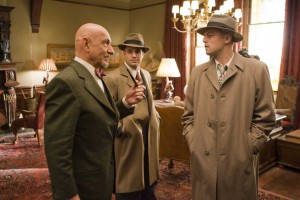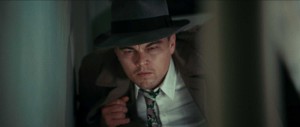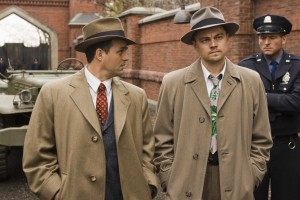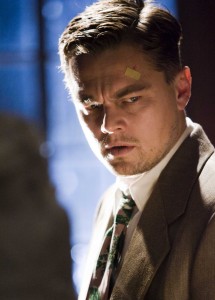Shutter Island
 Timing is one of the most delicate and important attributes a person can have. Every little decision we make can be affected by timing; from simply crossing the street when we have the light to knowing that the best time to take a bathroom break isn’t when you’re in the middle of carrying a piano up a flight of stairs.
Timing is one of the most delicate and important attributes a person can have. Every little decision we make can be affected by timing; from simply crossing the street when we have the light to knowing that the best time to take a bathroom break isn’t when you’re in the middle of carrying a piano up a flight of stairs.
Martin Scorsese’s Shutter Island, from its very first moments, is a nearly pitch perfect example of dropping a piano on your neighbor. The movie opens with fairly laconic footage of US Marshals Teddy Daniels (Leonardo DiCaprio) and Chuck Aule (Mark Ruffalo) entering through the gates of a mental institution for the criminally insane, which is located on an isolated island in New England. Scorsese, choosing to impose his will on the process, adds a pounding score, reminiscent of Eyes Wide Shut*. It’s a single note hammered home at a volume loud and out of scale enough to make us laugh, as if we’d entered a land of parody. The driving and piercing music is clearly intended to create suspense, but nothing we’ve seen at that point has been more than serene. So this sort of warning seems preposterous.
 All throughout Shutter Island, Scorsese’s timing is off; virtually every scene goes on a beat too long and like The Departed, it is so weighted down in plot, backstory, and repetition that the final product ends up unnecessarily bloated. Perhaps enamored with the idea of how computer technology can help a director fix mistakes or take shortcuts, Scorsese neglects to worry about anything other than playing around (and not playing well, there’s some truly dreadful green screen work here). And so we get what amounts to a 2 hour and 15 minute haunted house movie that’s no more sophisticated than its intellectual and stylistic cousin, Event Horizon. Now, other than as an example of slamming noises substituting for scene transitions, Event Horizon should be no one’s idea of a triumph. But Shutter Island is a surface movie without even much surface; it’s awash in stale ideas and character actors like Patricia Clarkson and Jackie Earle Haley who show up every 20 minutes to give us some handy exposition, and then leave.
All throughout Shutter Island, Scorsese’s timing is off; virtually every scene goes on a beat too long and like The Departed, it is so weighted down in plot, backstory, and repetition that the final product ends up unnecessarily bloated. Perhaps enamored with the idea of how computer technology can help a director fix mistakes or take shortcuts, Scorsese neglects to worry about anything other than playing around (and not playing well, there’s some truly dreadful green screen work here). And so we get what amounts to a 2 hour and 15 minute haunted house movie that’s no more sophisticated than its intellectual and stylistic cousin, Event Horizon. Now, other than as an example of slamming noises substituting for scene transitions, Event Horizon should be no one’s idea of a triumph. But Shutter Island is a surface movie without even much surface; it’s awash in stale ideas and character actors like Patricia Clarkson and Jackie Earle Haley who show up every 20 minutes to give us some handy exposition, and then leave.
Event Horizon at least has the good sense to be just a shade over 90 minutes, and so its flimsy characterizations and narrative can be pushed out of the mind quickly (provided you brought along your tinnitus medication). Shutter Island fills in the standard mental illness movie tropes with flashbacks and dream sequences, mostly to DiCaprio’s time in WWII and his supposedly suicidal wife. The scenes with his wife (which are hammy enough to play like one of The Kids in the Hall’s parodies of German expressionism), played by Michelle Williams, are out of The Lovely Bones surrealist handbook of contrasty colors and fire and brimstone. From what we see, it looks like Williams didn’t do herself in; she died of an overdose of visual clichés.
 The plot of Shutter Island is a complete shaggy dog story, circling us out of exhaustion. That’s a surprise, because it’s based on a book by Dennis Lehane, who also wrote the equally heavy-handed but tightly plotted and character based Gone Baby Gone. Shutter Island starts with the premise of DiCaprio called in to investigate the disappearance of a patient on the island. Then the premise changes up every reel or so, with the actors stuck to adjust their behavior accordingly, which is more than a bit of a jolt for us. The misdirections aren’t even all that convincing. Even the use of Max Von Sydow as an apparently evil doctor is telegraphed by the fact that Scorsese chose to cast Max Von Sydow (Spielberg made the same mistake in Minority Report). The final twist, one that is honestly sort of obvious, is so pointlessly elaborate that it takes nearly 30 minutes of screen time to lay out the ground rules for.
The plot of Shutter Island is a complete shaggy dog story, circling us out of exhaustion. That’s a surprise, because it’s based on a book by Dennis Lehane, who also wrote the equally heavy-handed but tightly plotted and character based Gone Baby Gone. Shutter Island starts with the premise of DiCaprio called in to investigate the disappearance of a patient on the island. Then the premise changes up every reel or so, with the actors stuck to adjust their behavior accordingly, which is more than a bit of a jolt for us. The misdirections aren’t even all that convincing. Even the use of Max Von Sydow as an apparently evil doctor is telegraphed by the fact that Scorsese chose to cast Max Von Sydow (Spielberg made the same mistake in Minority Report). The final twist, one that is honestly sort of obvious, is so pointlessly elaborate that it takes nearly 30 minutes of screen time to lay out the ground rules for.
 It’s fine that Scorsese has gone into genre mode and is less interested in exploring people than standard shocks and scares. The problem is that he hasn’t figured out how to bring his style with him. We get one or two scenes of the blown-out lighting and saturation look of director of photography Robert Richardson (who also performed the same task for Scorsese on Bringing Out the Dead). But there’s no consistency. It’s as if Scorsese fell in love with the way that Oliver Stone made Natural Born Killers, changing film stocks based on the scene, but couldn’t go through with it.
It’s fine that Scorsese has gone into genre mode and is less interested in exploring people than standard shocks and scares. The problem is that he hasn’t figured out how to bring his style with him. We get one or two scenes of the blown-out lighting and saturation look of director of photography Robert Richardson (who also performed the same task for Scorsese on Bringing Out the Dead). But there’s no consistency. It’s as if Scorsese fell in love with the way that Oliver Stone made Natural Born Killers, changing film stocks based on the scene, but couldn’t go through with it.
As it stands, Shutter Island is no more than a big budget version of Session 9, where random images and sounds were thrown at us whether they stuck or were laughable. It would fit in right at home in Shutter Island if DiCaprio eventually found the missing woman, only for them both to be crushed by a piano.
* Which can’t be an accident. If anything, Shutter Island is Scorsese’s attempt to make his version of Kubrick’s The Shining, in tone, style, and story (escalating insanity in an isolated area).



